Using the Grid Angle Cut Wizard | ||
| ||
-
From the Grid Design section of action bar, click Grid Angle Cut Wizard

- Select the Plies group.
-
Define the analysis criteria:
- Minimum cutting length of the machine.
- Width of the tows/tape laid down by the machine.
- Required angle between tangent and ply orientation.
-
Click Analysis (Compulsory).
The wizard:
- Finds all the ply contour vertices with discontinuities in tangency.
- Ignores those where the discontinuity is already the result of an angle cut.
- Checks the angle between the tangents at the vertices and ignores the vertices where this angle is too large.
- This angle is valid:
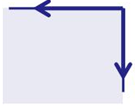
- This angle is invalid:

- This angle is valid:
- Checks the angle between each tangent and the ply orientation (displayed in dash green below) and ignores the vertices where this angle is lower than Required angle between tangent and ply orientation.
- This angle is valid:
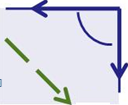
- This angle is invalid:
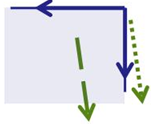
- This angle is valid:
- Finds out whether an angle cut is required or not.It computes an offset
from the vertex, equal to the Tow width, parallel to the
direction of the ply orientation. An angle cut is required if the length of this
curve is smaller than the Minimum length. In the examples
below:
- The offset from the corner is shown by the orange double-headed arrow.
- The ply orientation is given by the dotted green arrow.
- The minimum length is visualized as the blue line.
- A material addition is required in this case

- No material addition is required in this case
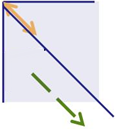
- Ignores vertices where the ply orientation is not consistent with the tangents.

The wizard groups the vertices coming from the same ramp support, according to orientation and tangency criteria. Below the yellow star stands for vertices with the same orientation, the blue star for vertices where the orientation differs, and the green star for vertices where the tangents differ.

Within a given group, the vertices are ordered according to their abscissa along an average bisector.
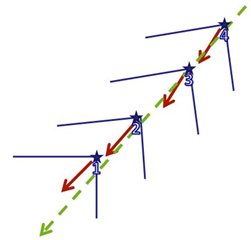
Those groups are displayed in the work area.
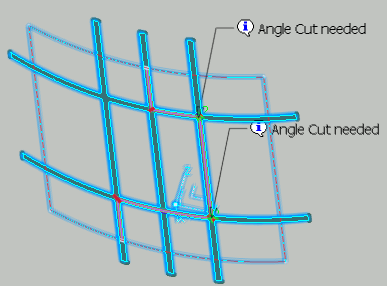
- Optional: Check Selected all vertices in corner to select all the vertices, whatever their orientation is.
- Click a callout.
- Create manual angle cuts.When the angle cuts are created for a group, its callout disappears, and you can proceed with the next group.
-
Proceed as explained in
Creating Angle Cuts Manually and click OK in the Angle Cut Definition
dialog box.
When the angle cuts are created for a group, its callout disappears, and you can proceed with the next group.
- Once you are done with all the groups, click OK in the Grid Angle Cut Wizard dialog box to validate and exit.
Associated Ramp Definitions are created in a dedicated node, under the Ramp Definitions in Composites Parameters. The node is displayed according to the option specified in Preferences.